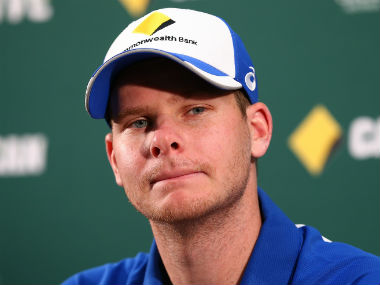When Virat Kohli declared he had no friends in the Australian team after a hard-fought series win at home against Steve Smith’s team last year, many of us thought he was overreacting after an intense Test series. The Australians are known for playing hard cricket and at times rubbing their opponents the wrong way, but off the field, they usually get along well with the Indian players, especially after they started sharing a dressing room with them in the IPL. [caption id=“attachment_4190943” align=“alignleft” width=“380”]  File image of Steve Smith. Getty Images[/caption] But as Smith’s team continued to get on the nerves of more and more opposition players, it started to appear Kohli is just stating what the rest of the cricket world feels, the Australian cricket team has no friends. The English team weren’t pleased when Smith and Cameron Bancroft mocked Jonny Bairstow in a press conference. Didn’t they themselves swear by the old “what goes on the field stays on the field” honour code? Australians started their series against South Africa with a lot of unnecessary drama over the use of stump microphones. Then with their over the top celebrations, send-offs, and off-the-field run-ins offended not just another cricket team but an entire nation. This wasn’t the usual in-your-face Australian aggression or mental disintegration as Steve Waugh would have called it. They seemed outright vicious with their jibes. When your quality depletes but you don’t want to lose your aura, you tend to replace it with false bravado. That’s what happened with the current Australian team which was barely a shadow of the great teams from the past two decades. Smith’s team understood they are just an average cricket team now, especially in overseas conditions where they were losing series after series. Perhaps that’s what prompted them to consider unfair means to satisfy the demanding fans and media back home. The ball-tampering scandal, has put Smith and his team under a severe trial. It is completely possible, as many experts have pointed out, that every team in the world does ball tampering to some extent. It is also possible that the Australians got caught while doing it simply because they are still rookies at it. But once exposed, there is no defending the deed. When Smith stood with Bancroft at the end of day’s play and took responsibility for not only trying to alter the condition of the ball but also meticulously planning it well in advance, he wouldn’t have expected the kind of backlash that has followed since his revelations. The ICC has already announced maximum punishment for Smith under its existing laws against ball tampering. But angry Australian supporters and cricket fraternity are demanding a much severe punishment. The way it played out on cameras has added a sense of soap opera-like drama to the whole saga. Getting caught on camera is embarrassing enough. Following it with a well-orchestrated effort to hide evidence is giving this the appearance of one of the biggest cricketing scandals of all time. While the crime committed was grave, it’s also important to not go overboard with our reactions. There have been calls to hand over at least a one year ban to Smith, David Warner and Darren Lehmann. A few others have already advocated for a life ban. There have even been some absurd comparisons with the spot-fixing scandal involving Salman Butt, Mohammed Asif and Mohammed Amir. To be honest, the only similarity between that scandal and the current one is that both were caught on camera. While cheating to gain an unfair advantage in the game is a severe offence, an outright corrupt practice like spot fixing that challenges the very existence of sport is a much graver sin. As a proud sporting nation, the Australians have been known to act like vigilantes when it comes to keeping the game clean. Australian umpires were hell bent at one point to no-balling Muttiah Muralitharan even when ICC had cleared his action. The Australian spin summit comprising past greats like Terry Jenner, Shane Warne and Ashely Mallet had decided the doosra will never be coached in Australia in an attempt to cleanse the game of chuckers. When ICC sanctions aren’t enough for their appetite, the Australians take it upon themselves to show the way. This holier than thou attitude has already cost the self-confessed “most hated man in cricket”, Trevor Chappell a cricketing career and a marriage for the underarm bowling incident. After struggling with mental issues and national vilification, Trevor has already warned that Smith will be haunted for life as a result of the ball tampering incident. The Australian pride has been dented as the whole world has jumped on the bandwagon to crucify them. Ex-players are taking this opportunity to exhume old grudges. It’s time for calm heads to prevail and judge the current offence for what it is. Ball tampering is ball tampering whether it was planned in advance like the Smith/Bancroft or Michael Atherton incident or done in the spur of the moment like Shahid Afridi chewing the ball in the dying stages of a game. We all want to keep our sport to be clean, we don’t want to destroy a player’s life. The punishment should be strict enough to serve as an example, but it shouldn’t be disproportionately severe just to appease the public outcry. The Australian way of playing cricket has certainly been questionable over the years, but Smith isn’t responsible for an entire cricket culture and shouldn’t take the fall for every offence committed by a man wearing the baggy green. Smith and others involved in breaking the laws of the game should serve their time, but they also deserve the opportunity to make amends and return to the game that provides them not just a chance to showcase their skills but also gives them their livelihood.
The punishment to the ball-tampering scandal should be strict enough to serve as an example, but it shouldn’t be disproportionately severe just to appease the public outcry.
Advertisement
End of Article


)

)
)
)
)
)
)
)
)



